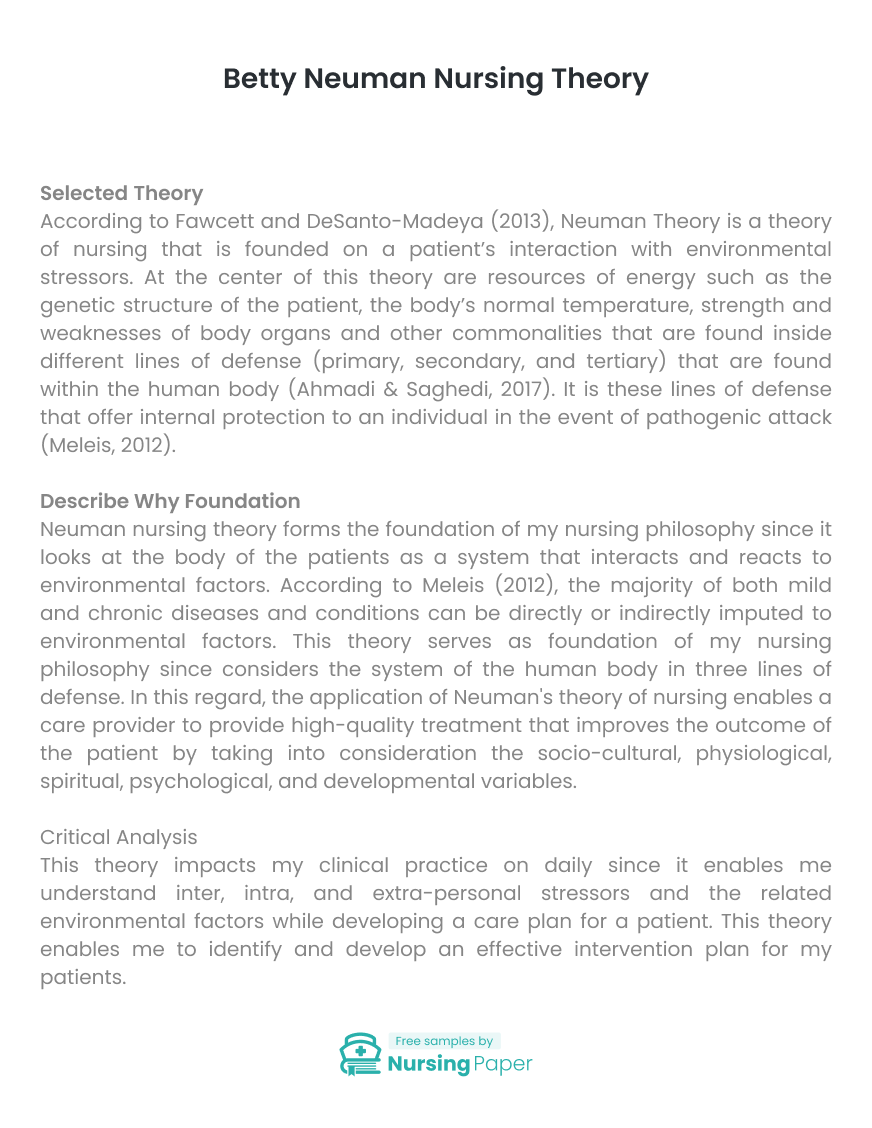
Betty Neuman Nursing Theory
Selected Theory
According to Fawcett and DeSanto-Madeya (2013), Neuman Theory is a theory of nursing that is founded on a patient’s interaction with environmental stressors. At the center of this theory are resources of energy such as the genetic structure of the patient, the body’s normal temperature, strength and weaknesses of body organs and other commonalities that are found inside different lines of defense (primary, secondary, and tertiary) that are found within the human body (Ahmadi & Saghedi, 2017). It is these lines of defense that offer internal protection to an individual in the event of pathogenic attack (Meleis, 2012).
Describe Why Foundation
Neuman nursing theory forms the foundation of my nursing philosophy since it looks at the body of the patients as a system that interacts and reacts to environmental factors. According to Meleis (2012), the majority of both mild and chronic diseases and conditions can be directly or indirectly imputed to environmental factors. This theory serves as foundation of my nursing philosophy since considers the system of the human body in three lines of defense. In this regard, the application of Neuman’s theory of nursing enables a care provider to provide high-quality treatment that improves the outcome of the patient by taking into consideration the socio-cultural, physiological, spiritual, psychological, and developmental variables.


Critical Analysis
This theory impacts my clinical practice on daily since it enables me understand inter, intra, and extra-personal stressors and the related environmental factors while developing a care plan for a patient. This theory enables me to identify and develop an effective intervention plan for my patients. For example, during primary prevention for patients with obesity, it enables me to develop an effective nutrition plan and physical activity plan to patient wellness. Second, tertiary prevention as advocated by this theory enables me to ensure wellness of my patients through effective monitoring progress.
1. Ahmadi, Z. & Saghedi, T. (2017). Application of the Betty Neuman systems model in the nursing care of patients/clients with multiple sclerosis. , 3(3). https://doi.org/10.1177/2055217317726798
2. Fawcett, J. & DeSanto-Madeya, S. (2013). Contemporary nursing knowledge: Analysis and evaluation of nursing models and theories. (3rd Ed.). Philadelphia, PA: F. A. Davis Company.
3. Meleis, A. I. (2012). Theoretical Nursing: Development and Progress. London: Wolter Kluwer.



The download will start shortly.

The download will start shortly.
 Subject:
Nursing
Subject:
Nursing  Number of pages: 2
Number of pages: 2  Subject:
Nursing
Subject:
Nursing  Number of pages: 2
Number of pages: 2  Subject:
Nursing
Subject:
Nursing  Number of pages: 4
Number of pages: 4  Subject:
Health and Social Care
Subject:
Health and Social Care  Number of pages: 2
Number of pages: 2  Subject:
Medicine
Subject:
Medicine  Number of pages: 4
Number of pages: 4  Subject:
Nursing
Subject:
Nursing  Number of pages: 21
Number of pages: 21  Subject:
Nursing
Subject:
Nursing  Number of pages: 5
Number of pages: 5  Subject:
Nursing
Subject:
Nursing  Number of pages: 6
Number of pages: 6  Subject:
Nursing
Subject:
Nursing  Number of pages: 5
Number of pages: 5  Subject:
Nursing
Subject:
Nursing  Number of pages: 5
Number of pages: 5  Subject:
Health and Social Care
Subject:
Health and Social Care  Number of pages: 4
Number of pages: 4  Subject:
Nursing
Subject:
Nursing  Number of pages: 11
Number of pages: 11  Subject:
Nursing
Subject:
Nursing  Number of pages: 3
Number of pages: 3  Subject:
Nursing
Subject:
Nursing  Number of pages: 7
Number of pages: 7  Subject:
Nursing
Subject:
Nursing  Number of pages: 3
Number of pages: 3 
